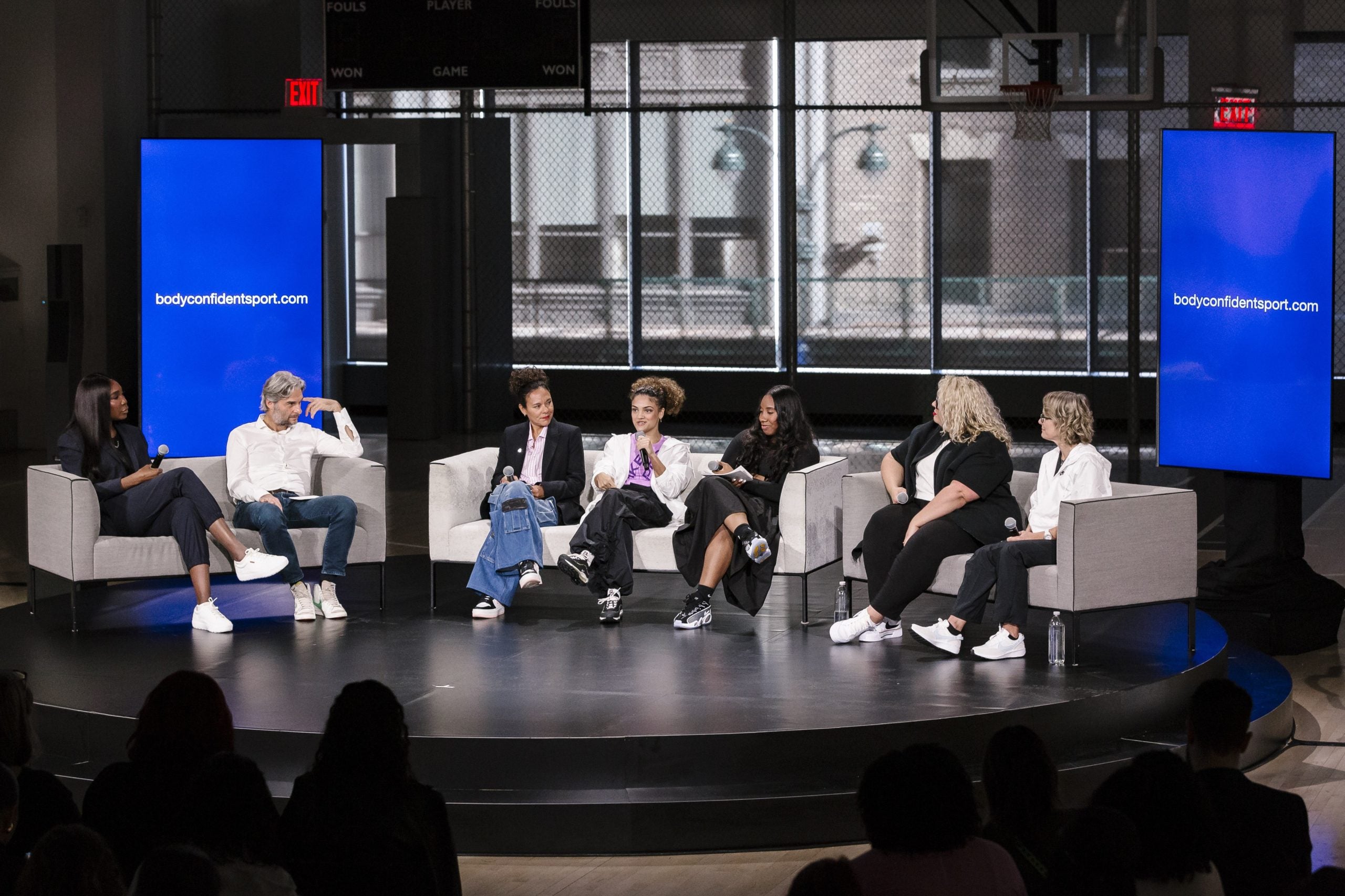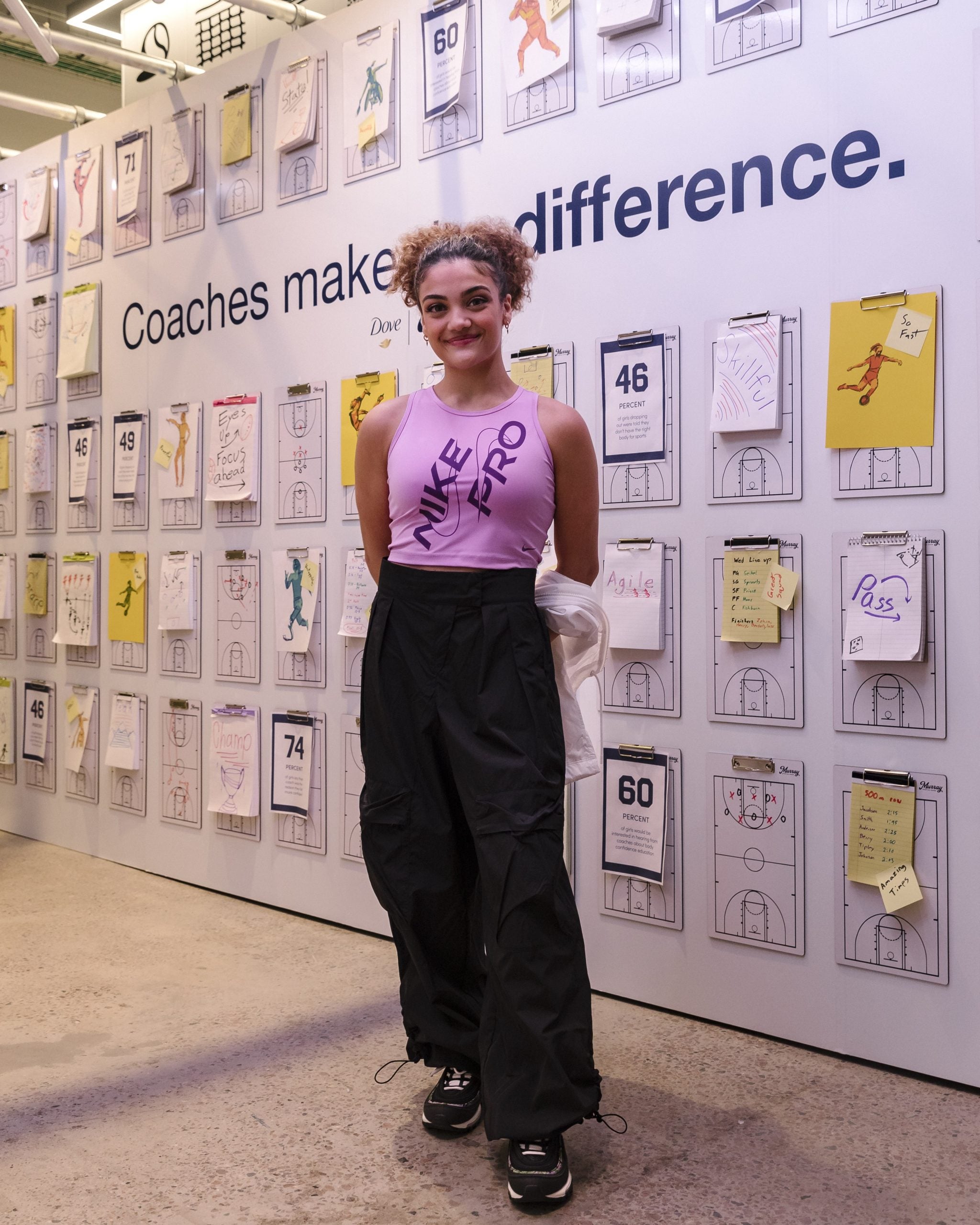
Did you know that 45 percent of teenage girls in the world are dropping out of sports? Or that 67 percent have considered doing so? I certainly didn’t know. As someone who played multiple sports through high school, I never stopped to wonder why so many of the girls I started with didn’t continue. As for the young girls of today, surveys have found that a big reason for their decision to part with athletics has to do with body confidence concerns, from how their frames change as they go through puberty, to being discouraged by comments from coaches and others about how they’re physically built. With that reality in mind, Dove, the brand known for their Self-Esteem Project and efforts to uplift young girls, teamed up with Nike, the brand synonymous with athletes and sport, to help put a dent in these statistics.
On October 24, young athletes, journalists, influencers and more came together at Nike’s New York City headquarters to talk about this reality and a new tool from Dove and Nike created to support young female athletes.
“We care a lot about access to sport and a good experience in sport. And that’s not happening for our girls,” said Vanessa Garcia-Brito, VP, NIKE, Inc. chief social & community impact officer, during an insightful panel on the topic. She was joined by a few very knowledgeable individuals on all things body positivity, girlhood and sport, including Olympic gold medalists like gymnast Laurie Hernandez and Venus Williams, who both wanted to help get the word out about this issue.

“Gymnastics is a really body prominent sport. It’s something that is so easily criticized because the only thing we’re in is a leotard. I mean you can see everything,” said Hernandez about her experience growing up as an elite gymnast during the panel. “The way that a coach responds to when girls and women and you know identifying teenagers hit puberty is important because it’s a really formative time.”
She can relate because she faced comments about her body from a coach when she was 12 that changed the way she saw it.
“In my sport it’s a really big problem. I had a coach who was very critical of my body type who once mentioned, ‘You have a really boxy body.’ I was like, I don’t know what that means. But I went home that day and checked myself in the mirror and I just remembered doing these routines and sucking in and making sure that my body could be perceived in the way that I wanted it to be perceived rather than focusing on what I was actually doing.” While her family is close knit and was the support system that kept her in the sport, the comments still are impactful even as Hernandez recently turned 23. “That body awareness really affected the way that I performed and to this day I still notice it. So again, that’s why topics like today are so important to talk about because I wouldn’t have known at 12 to bring this up or known that this is what the issue was. But we get to do that.”
We also had the chance to hear from young girls in sports like rock climbing, hockey and cross country, including a young Black runner named Terrica who talked about the doubts she had about her abilities due to changes caused by puberty. She became taller than her peers and started to see herself as much bigger than them too.
“I was at a healthy weight for my age, but I managed to convince myself that I was too heavy to be a good athlete or to run,” she remarked, noting that she noticed her times started to go up compared to the year prior. “In running, there’s this idea that being lighter or smaller is better because you’re carrying less weight around so it’s easier to make the time you’re trying to run. So I really started fixating on my body image, especially when I started changing. I was focused more on the aesthetics of my body than the functionality of it.”
For Venus Williams, who has literally been asked by press at conferences during tennis tournaments about whether or not she put on weight, she offered the girls, and the women in the audience in general, advice. “What you tell yourself is what you believe,” she said. “If you tell yourself ‘I don’t feel good about my body. I can’t do this,’ that’s what the mind believes. The same amount of time that you’re saying that is the same amount of time you can say it’s amazing. ‘I can do this.'” How do you use your time? And there’s a price for everything and so the price is heavy for everything. If you put in the work that’s going to be a lot of hard work. If you put in the work to tell yourself those things, that’s going to be work, if you do the work in to tell yourself negative things that’s going to be the same amount of time. How do you want to use your time? So it is a choice every single time and you always have to bet on yourself. That is your best bet.”
After the discussions, everyone present had the chance to feel confident in their bodies while dancing with London’s Curve Catwalk team. Participants also checked out the tool Dove and Nike have created to keep girls in sports: bodyconfidentsport.com. The free open-source tool is a resource for supporting and coaching 11 to 17-year-old girls with the aim of helping to help build their body confidence and remind them that they belong in their sport of choice. The tool took two years to bring to fruition and involved the input of close to 5,000 adolescents from around the world. It offers curriculum and guides to help coaches, which are really just anyone who has an influence on young people in this age group, inspire them to know the truly amazing things their bodies are capable of, as opposed to focusing on what they look like. Both Hernandez and Williams say a tool like that could have made quite the difference when they were growing up and playing.
“I was fortunate to have really strong role models, but not everyone has that. My parents understood the pressures that I was going to go through to hopefully achieve my dreams, and they were supportive of that,” Williams shared with ESSENCE in an interview. “But this is something that I would’ve wanted to see some of my colleagues have a chance to have, because I saw the journeys that they went through. A lot of them fell to the sidelines because of what they went through. They didn’t have those opportunities. So I like being a part of this because it makes me a part of this solution and also to be able to continue this conversation through sport, through something that I love, through something that’s changed my life.”

“There were plenty of times that I wanted to drop out,” Hernandez says. “I think, well, especially for gymnastics and for what we’re talking about today, the age from 11 to 17 in the sport of gymnastics, that is when everybody quits and it starts young. It starts in that moment where you realize that your body’s starting to shift. That’s typically the age where we start to level up. And a lot of athletes drop out.”
She adds, “I think this is so integral to the success of what’s to come. I also look at my experience in sport, and a lot of that still sticks with me to this day. I still will do body checks and I still will be like, ‘No, this outfit makes me look boxy. I can’t wear it.’ There’s still that voice in my head that lingered from sport into just everyday life. So, I think a program like this will really impact our future generation of athletes and of coaches. It’s very important.”
Having a good coach after dealing with a less-than-positive one provided Hernandez with the support she needed to continue in her sport. But she encourages young girls who have let the way they see their bodies, or the way others have told them they see it affect them, to show themselves grace. “It is very easy for us to get in our own ways. And a lot of that comes from self-talk and the awareness of our bodies. And if we can be kind to ourselves and be kind to our bodies and give ourselves the grace to let our bodies morph and change, and then to be patient while we relearn all the things that we already knew, I think that mindset would help keep a lot of girls in sport.”
As for Williams, body confidence is something she continues to enforce for herself an adult. She’s dealt with autoimmune issues, specifically, Sjogren’s Syndrome, that has changed what her body is capable of. But she focuses on what it can do, and encourages girls to not let feelings in a moment change their love of the game.
“You can’t make decisions in your life based on a moment. ‘In this moment, I don’t feel good. This moment, my body’s growing. This moment, I’m smaller than I want to be. This moment, I’m larger than I want to be.’ It’s a moment. It doesn’t end there,” she says. “There’s a lot more moments to go. You get to choose your own narrative, and don’t let anyone take that choice away from you, especially yourself.”
For more information on the bodyconfidentsport.com tool, check out its site here.





